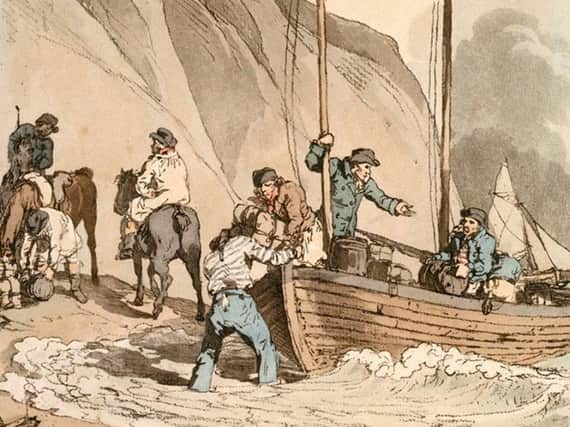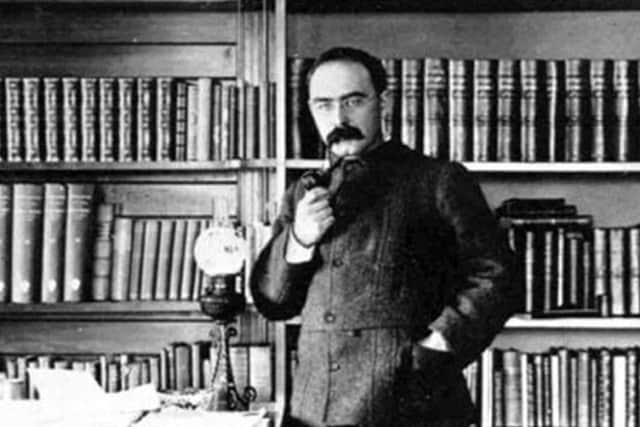Watch the wall, my darling while the gentlemen go by


And who doesn’t appreciate a bargain even if said bargain isn’t always what it seems?
Was ever thus. Some 250 years ago Brighton’s Steine area saw a number of shops opened up that deliberately played to the public’s desire for a good deal. Indeed, more than a good deal because these shops - some stocked with a cornucopia of desirable china, lace and millinery, others with tea, coffee and exotic alcoholic beverages – artfully traded on the hint that all the goods had been imported into Sussex without the knowledge of the authorities. In other words, they were smuggled.
Advertisement
Hide AdAdvertisement
Hide AdThe fact was that little if any of the stock for sale were the fruits of smuggling. Indeed, if such shops were truly engaged in the disposal of smuggled items you can be sure that the Excise men would have quickly rounded up the suppliers, shopkeepers and eager customers, said “Thank you very much” and packed them all off to gaol.


What was sold by these pioneer “Del Boys” were shoddy or counterfeit goods. This didn’t matter too much to many of their customers. They were happy to grab a bargain and could then boast to their friends of how they’d brazenly put one over on the Revenue.
Smuggling was indeed rife in those days in Sussex but it was by necessity a clandestine business, carried out by wary, secretive bands of men. Their goal was to safely deliver contraband landed on the coast to inland destinations, the biggest of which was London.
The clergy weren’t immune to the attractions of smuggling. One story concerns the Vicar of Preston Church. At the time the parishes of Preston and Hove were linked, a service being conducted in each parish on alternate Sundays. One Sunday the Preston Vicar noticed that the church bell was not being rung when he turned up to fulfill his duty. Enquiring why this was so, he was told that he had got his Sundays mixed up. Though doubtless nonplussed, the Vicar nevertheless pressed the Sexton further and learnt that smugglers, fearing arrest, had needed an overnight haven to stash their haul of illicit spirits and tea. In return for securing the sanctuary of the church, the smugglers promised a handsome donation.
Advertisement
Hide AdAdvertisement
Hide AdAnother audacious incident took place in broad daylight on 19th July 1821 when Brighton’s Level was packed with people out celebrating the coronation of George IV. Even the excise men were among the spectators. Taking advantage of the diversion, a band of smugglers gathered in the stable yard of the Old Ship Hotel on the seafront. When satisfied that the coast was clear, the men retrieved from a hiding-place on the beach a consignment of “duty free” Dutch gin. The kegs were slung on to the backs of waiting horses and swiftly spirited out of town.


Smuggling could be a rewarding activity but one not without risk. An inscription on a tombstone in the churchyard of All Saints, Patcham, recounts a desperate encounter between smuggler Daniel Skales and a customs man who shot him after he refused to surrender his booty on the night of 17th November, 1796:
Alas! Swift flew the fatal lead,
Which pierced through the young man’s head.
He instant fell, resigned his breath,
And closed his languid eyes in death.
Two years earlier, “riding officers” interrupted smugglers landing tubs of gin. The confiscated cargo was intended for the customs house at Shoreham. A pair of officers couldn’t resist temptation and opened a tub in celebration of one’s wedding due to take place next day. In the morning the two were discovered insensible on the beach. The hapless bridegroom had drunk so much that he actually died; some stag night that was!
Alfriston is indelibly linked to smuggling lore. It’s a village perfectly positioned in a valley just a few miles from secluded Cuckmere Haven where ships could offload contraband in secret. Writing in 1904, Sussex chronicler E.V. Lucas noted: “For Alfriston men smuggling was simply their destiny. Farmers, shepherds, ostlers and what you will, these Alfriston men might be respectable by day but when the ‘darks’ came round they were smugglers every one.”
Advertisement
Hide AdAdvertisement
Hide AdThe notorious Alfriston Gang had dispersed by the 1830s after three brothers were convicted and transported to Australia. Then gang leader Stanton Collins (who lived at Alfriston’s Market Cross House) was imprisoned for rustling sheep. The last known gang member, Bob Hall, died in 1895, aged 94.
Farther along on his 1904 travels, E.V. Lucas met a Burwash lady who recalled how, as a child, after saying her prayers, she was sometimes put to bed early with a strict warning: “Now, mind, if the gentlemen come along, don’t you look out of the window.”
Rudyard Kipling was a famous resident of Burwash and he would most certainly have met Lucas. Indeed I am sure Kipling took inspiration from Lucas and the Burwash lady’s memory for his own Sussex history book, “Puck of Pook’s Hill” published two years later in 1906. It contains Kipling’s famous poem, “A Smugglers’ Song” that features this evocative opening verse:
If you wake at midnight, and hear a horse's feet,
Don't go drawing back the blind, or looking in the street,
Them that asks no questions isn't told a lie.
Watch the wall, my darling, while the Gentlemen go by!